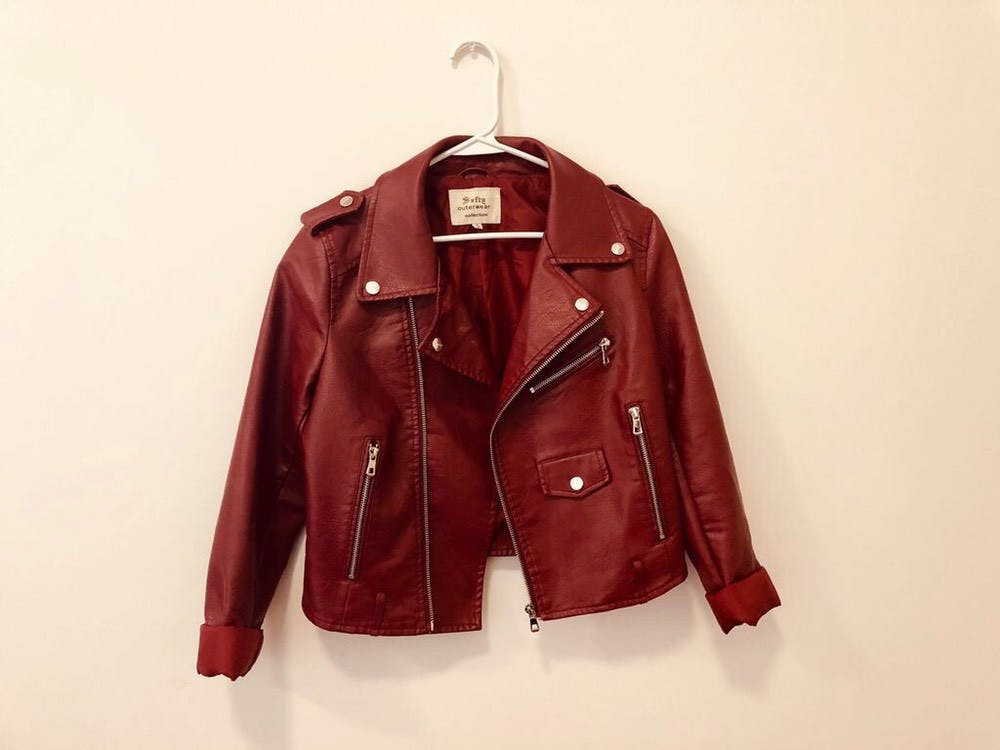
COURTESY PHOTO.
My mom tells me all the time that I need another jacket like I need a hole in my head.
They’re my favorite item of clothing to wear because they’re stylish, comfortable and can be layered on top of other clothing. Jackets are my weakness. One jacket that I recently brought back to campus is a wine colored, vegan leather, motorcycle jacket that I bought from ASOS last year. I knew I wanted an edgy addition to my wardrobe and after shopping around for a few weeks, I decided on this jacket because of its textiles.
I personally do not believe in wearing clothes made from animals. Therefore, I was excited to find a moto jacket that was vegan. A quick search online showed me that vegan leather is praised by PETA for being animal friendly and indeed made of alternative materials. I read many news articles pushing vegan leather as the new fashion wave that every animal lover should buy.
At the time, I had no clue what vegan leather really meant; what standards a company had to follow, what substitute materials were used and which organization regulated this process were all lost to me. I was simply lured in by the “vegan” label and idea of being a conscientious consumer. I later learned that this was not completely true.
Instead of animal hides, vegan leather is usually made of polyvinyl chloride (PVC), polyurethane (PU) and other textile-polymers. Chemicals — goody. Vegan leather, or faux leather, is manufactured through a process in which plastic-based synthetics are mixed, burned and pressed before being attached to a fabric backing.
This process releases dioxins, which are extremely dangerous to not only the workers creating these garments but to the environment as well.
Dioxins are chemical compounds classified as persistent organic pollutants. These chemicals are not biodegradable. Because synthetic and mixed fabrics are much more difficult and expensive to recycle, these garments are often being thrown out with the rest of our waste — which further allows these dioxins to enter our environment.
While some designers are using more natural materials to make their vegan leather, many are not.
[pullquote speaker="" photo="" align="center" background="on" border="all" shadow="on"]One win for animal protection comes at the expense of human and environmental safety. [/pullquote]
Since I was young, I have noticed the debate around animal use in cosmetics and fashion. But I find it concerning that even though this has been a long-term battle, we still haven’t found a solution. It seems that everything is a compromise and in this case, one win for animal protection comes at the expense of human and environmental safety.
I believe this is another deviation between marketing and consumer knowledge. I am constantly seeing topics such as animal cruelty, social justice and environmentalism incorporated into marketing campaigns. I feel that in today’s society where being “woke” is the cool and honorable thing to do, consumers are more likely to buy whatever labels will help them do so.
I am guilty of this.
I saw “vegan leather” in the product description and instantly got a warm, tingly feeling as I added my the jacket to my online shopping cart. I thought I had done my job as a good human being. It was only after I had explored several articles and gotten past the PETA homepage that I realized there was a serious problem with what the textiles companies were marketing to us.
Over the course of writing The Lookbook, and my shopping addiction, I think I’ve learned a lot about the fashion industry and consumerism. But I’m always surprised at how much I’m still learning.
Being a conscientious consumer is difficult and time-consuming. It is also a process that is not yet perfect. However, what I learned from this purchase was to do your research extensively and not to be lured in by a product description you don’t fully understand.
Comments


![Copy of Editorial [Susanna] (3) (1) (2) (1).JPG](https://snworksceo.imgix.net/mbc/11c1e285-1b2c-4ee9-9d20-4a2f24335290.sized-1000x1000.JPG?w=1500&ar=16%3A9&fit=crop&crop=faces&facepad=3&auto=format)

